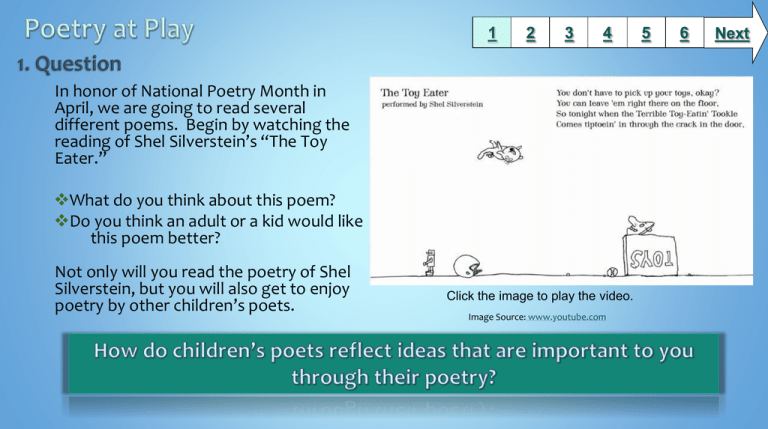
1
2
3
4
In honor of National Poetry Month in
April, we are going to read several
different poems. Begin by watching the
reading of Shel Silverstein’s “The Toy
Eater.”
What do you think about this poem?
Do you think an adult or a kid would like
this poem better?
Not only will you read the poetry of Shel
Silverstein, but you will also get to enjoy
poetry by other children’s poets.
Click the image to play the video.
Image Source: www.youtube.com
5
6
Next
1
All the resources below will introduce you a variety of
children’s poems.
“Daydreamers” by Eloise Greenfield
“Louder” by Jack Pretlutsky
Jack Pretlutsky’s website
“I Spy Riddle Rhyme” by Jean Marzollo
Many poems by Shel Silverstein
“How to Eat a Poem” by Eve Merriam
“I Raised My Hand in Class” and other poems
by Kenn Nesbitt
“Anthropoids” and other poems
by Mary Ann Hoberman
“Mosquito” by J. Patrick Lewis
“A Bad Case of the Sneezes” by Bruce Lansky
You should also look in
your library’s poetry section!
2
3
4
5
Image Source: www.clipart.com by subscription
6
Next
1
2
3
4
5
6
Next
Your first step is to read the poems.
Next, you will need to organize what you
have learned.
This graphic organizer will help you think
about ideas presented in the poems .
Remember that since these are notes,
complete sentences are not necessary.
Image Source: www.clipart.com by subscription
1
2
3
4
5
6
Next
Now that you have read several poems,
you should begin thinking about why these
are poems that you and other children
would enjoy.
You will write your own poem, using these
poets as your inspiration. Begin to think
about an idea that would be a good topic
for poem. Your poem should be something
that your friends and classmates would
have fun reading.
Your poem will be assessed based on your
ability to create a poem that would appeal
to you and your friends.
Image Source: www.clipart.com by subscription
1
2
3
4
5
6
Write your own theme
poem!
Poetry Splatter- Write your
own silly poems by
choosing the words to
“splat” in the poems!
Create a comic strip that
illustrates your poem.
Image Source: www.clipart.com by subscription
Next
1
BCPS Curriculum
Grade 3 Library Media- Poetry
Common Core State Standards
Reading: 1. Read closely to determine what the text says explicitly and to make logical
inferences from it; cite specific textual evidence when writing or speaking to support
conclusions drawn from the text.
Writing: 7. Conduct short as well as more sustained research projects based on focused
questions, demonstrating understanding of the subject under investigation.
Standards for the 21st Century Learner
1.1.6 Read, view, and listen for information presented in any format (e.g. textual,
visual, media, digital) in order to make inferences and gather meaning.
2.1.3 Use strategies to draw conclusions from information and apply knowledge to
curricular areas, real-world situations, and further investigations.
4.1.3 Respond to literature and creative expressions of ideas in various formats and
genres.
Maryland Technology Literacy Standards for Students
3.0: Use a variety of technologies for learning and collaboration.
2
3
4
5
6
Time Frame:
2 50 minute periods
Differentiation:
Direct students to use comprehension tools included in
databases, such as: audio read-aloud, labeled reading
levels, and embedded dictionaries.
Direct students to websites and videos that read the
poems paired with visuals
Learning Styles:
Auditory, Visual, Kinesthetic, Reflective, Sequential, Field
Independent
Notes to the teacher:
You may need to present the first slide to the class, as
students cannot access the YouTube video independently.
Designed for individual research instruction.
Extend this research activity by having students share
their original poetry.
Students may write their own poems on paper or by using
Microsoft Word.
Last updated: July 2012
Created by Karen Connor, Library Media Specialist
BCPS Slam Dunk Research Model, Copyright 2012, Baltimore County Public Schools, MD, all rights reserved. The models may be used for educational, non-profit school use only.
All other uses, transmissions, and duplications are prohibited unless permission is granted expressly. This lesson is based on Jamie McKenzie’s Slam Dunk Lesson module.









